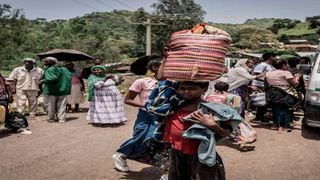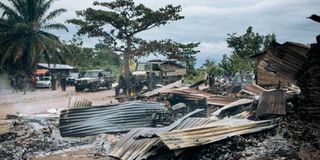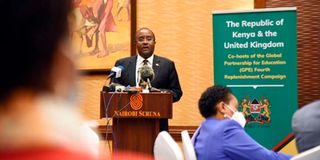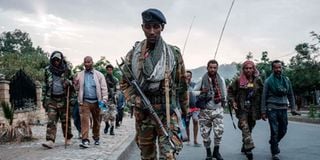Breaking: Autopsy reveals how Cyrus Jirongo died

A girl carries her belongings as she leaves the city following a huge battle going on between Ethiopian National Defence Force (ENDF) and pro-TPLF rebels, in Zarima, 140 kilometers from Gondar, Ethiopia, on September 16, 2021.
News
Premium
Kenya: African conflicts need dialogue, not sanctions
Kenya says Africa’s conflicts should be resolved by encouraging parties to the table for dialogue and supporting those talks, rather than threatening warring sides with sanctions.
This is the call Nairobi is making in nearly every session it has chaired at the UN Security Council this October, the time when Kenya will hold a month-long presidency of the most powerful organ of the UN.
From conflicts in Ethiopia, to Libya, Democratic Republic of Congo and the Central Africa Republic, Kenya says international partners must condemn rights violations and protect civilians. But they must also support rebuilding of local institutions as well as utilise local conflict resolution means.
“Africans understand better the root cause of conflicts that have afflicted our continent,” said Isaiya Kabira, the Director-General for International Conferences, Media events and communications, at the Kenyan Foreign Affairs Ministry.

Burnt down houses in the village of Manzalaho near Beni on February 18, 2020. Nineteen civilians in the eastern Democratic Republic of Congo were burned and hacked to death on Friday by Ugandan Islamist rebels.
“As much as we appreciate support and encouragement from our partners, we must build capacity beyond parachute diplomacy and look for local solutions for local challenges. Outsiders may come and stop and help stop the fire in your house but a neighbour will be there to start the rebuilding of your home,” he told Nation.Africa on Friday, referring to what the African Union calls ‘African solutions for African problems.’

Mr Isaiya Kabira, the Director-General for International Conferences, Media events and communications, at the Kenyan Foreign Affairs Ministry.
This month, Kenya is presiding over the Council’s meetings at a time of enduring conflict in Tigray, Ethiopia. There has also been continual violence in the Democratic Republic of Congo, Libya, the Central Africa Republic as well as the coup situation in Guinea. In all these, the African Union has struggled to imposed influence, but Kenya says those very tools by the continental bloc have helped resolve other crises in the past and should be given a chance, with resources.
Aerial bombardments
In Ethiopia, where fighting resumed on Friday with aerial bombardments, Kenya and other African members of the Council (Niger, Tunisia and the Caribbean island of St Vincent and Grenadines usually act as A3+1 group), have opposed any bids for unilateral sanctions. The AU appointed former Nigerian President Olusegun Obasanjo as Special Envoy for the Horn, with Ethiopia his first task. He has made little progress.
But the A3+1 argue that while civilian life must be protected, humanitarian corridors unfettered; only Ethiopians must see the light first to protect their country.
“We are happy to consider text that is balanced and focused on those issues but one of the most important things we said, particularly on the AOB on Ethiopia is how important it is for the safety and security of humanitarian work to be safeguarded and also the importance for us to depoliticise humanitarian space especially in situations that are highly charged in a political sense,” Dr Martin Kimani, Kenya’s Permanent Representative to the UN told journalists last week.
Threatened sanctions
Ethiopia recently expelled senior UN staff for meddling. And the US which had threatened sanctions on Ethiopia more than two weeks ago has insisted that dialogue must be held, hostilities ended or spoilers will be sanctioned.

Ethiopian soldiers carry an injured colleague on a makeshift stretcher as they arrive at the Mekele Rehabilitation Center in Mekele, the capital of Tigray region, on July 2, 2021.
“We do have tools at our disposal…it could be that we do a resolution (at UNSC), but also the President (Joe Biden) signed an executive order a couple of weeks ago that puts us at a possibility of imposing sanctions against individuals for gross violations and blocking of humanitarian assistance,” said Linda Thomas-Greenfield, US Ambassador to the UN, last week.
“That is available for our use when we need it.” The threat of sanctions was seen in Addis as undue pressure, with the Ethiopian government arguing the real culprits are being equated to a formal government.
Dr Kimani said Nairobi would rather see the international community take an approach that will save lives and build trust, than have Ethiopia isolated from the global stage.
“Kenyan government, and our delegation, is certainly not considering the questions just about (accusations of Ethiopia becoming) pariah state or what the response of the Ethiopian government is. We are considering all the statements…and we are continuing to be actively be informed and trying to be responsive to the situation,” Kimani said. The UNSC has been unable to discuss even a draft statement on Ethiopia since July.
In July, the A3+1 had warned against impositions, saying that Ethiopia must be encouraged to choose dialogue.
Later in August, they said: “We urge caution in the use of any unilateral coercive sanction measures that risk Ethiopia’s economic collapse.”
“Their use will only worsen the humanitarian crisis. We have seen that its powerful capabilities contribute to resolving many conflict situations in the continent, and we believe they can be used in Ethiopia.”
Rome Statute
On Thursday, the European parliament adopted a resolution on Ethiopia calling on Addis Ababa to sign and ratify the Rome Statute of the International Criminal Court and immediately “account for the forced disappearances of all civilians, to release those detained without credible evidence of a crime.” It also asked member states to halt arms and surveillance technology sales to Addis Ababa claiming they have facilitated “attacks on civilians and perpetrate human rights violations.”

Rebels who are pro-TPLF (Tigray People's Liberation Front), arrive after eight hours of walking in Mekele, the capital of Tigray region, Ethiopia, on June 29, 2021.
For Kenya though, carrots will be better tools than sticks, not just on Ethiopia but in every other conflict scene on the continent because they can put the ball in the court of warring parties.
In the DRC, where rebel groups have continued to maim and kill, Kenya says the world must support “disarmament, demobilisation, community reintegration and stabilisation
(DDRCS” programme launched by Kinshasa as a long-term solution to violence.
“We urge the international community, financial and technical partners, to continue to support the government of DRC in strengthening the capacities of its national institutions responsible for governance,” Dr Kimani said last week during a briefing session on the DRC.
The DRC conflict in eastern parts of the country has added to the frequent outbreaks of Ebola. At least 1.3 million people have been displaced this year alone, meaning the country now has 5 million people who have lost their homes in the country, and another 536,000 taking refuge in neighbouring countries.
Nairobi says DRC can end the violence if it improves its laws, equips the security forces better and is allowed to utilise its massive resources to entice rebels to lay down arms.
“It is time that the role of natural resources is transformed to sources of legitimate socio-economic opportunities that would lead to expanded revenue streams for the government to provide basic services.”
In earlier sessions last month on Libya, Kenya also called on the world to impose arms embargoes as well as Libya’s asset freezes in consultation with the interim authorities there.
“It is important that regional and international attention be paid to the need for disarmament, demobilisation and reintegration. In this regard, we urge that the impending UNSMIL (UN stabilisation mission in Libya) mandate renewal acknowledges this, to help prevent the possible cyclic conflict in the Sahel region and beyond,” Dr Kimani said on September 10, during a briefing and consultation session on UNSMIL.
“A regional perspective in the management of the peace process would be necessary to tackle the continued illegal migration challenge. We therefore encourage continued consultations between Libya and neighbouring states with the support of the UN and initiatives such as the Quartet Agreement between Libya, Chad, Niger and Sudan.”
The A3+1 had said earlier it encourages “efforts of regional and sub-regional organisations” in dealing with the situation in Central Africa Republic, where a president elected in December has faced threats from rebels opposed to his rule. CAR is also under an arms embargo.




